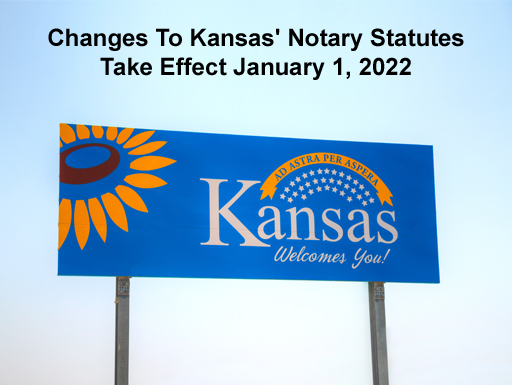Notary Public Underwriters Blog
Changes To Kansas' Notary Statutes Take Effect January 1, 2022
- Details
- Published: December 7, 2021

You may not be aware but changes to Kansas' notary statutes will take effect January 1, 2022. These changes affect many aspects of notary public law, including record book (journal) requirement, increase in the bond amount, establishing acceptable identification, provide grounds for refusal to notarize, and permit notaries to provide remote online notarizations. At Notary Public Underwriters, we're here to help you be aware of and comply with changes in the notary law.
Record Book (Journal)
All notaries must keep a notary record book (journal) of all notarial acts performed, and retain the record book 10 years after the last entry.
The Notary Public Record Book is an important tool that provides a written record of your official acts as a notary. It can help you recall a particular notarization should it come into question at a later date and/or in the event you are faced with a claim for performing a notarial act improperly. Order one today to ensure you are compliant on January 1.
Report Lost or Stolen Notary Tools
Notaries must promptly notify the Secretary of State if their record book or notary stamp is lost or stolen.
Notary Bond
The new law will increase the bond amount from $7,500 to $12,000 for applicants renewing their appointment on and after January 1, 2022.
Acceptable Identification
Notaries may accept an identification credential such as a driver's license, passport, or other government-issued ID. An expired identification can be accepted, as long as it is not expired by more than three years at the time of the notarial act.
Grounds For Refusal to Notarize
Notaries may not notarize a document if the notary or notary's spouse has a financial or beneficial interest in the document. Notaries are permitted to decline performing a notarization if the notary is not satisfied that the signer is competent or has the capacity to execute the record; or that individual's signature is knowingly and voluntarily made. A notary may refuse to perform a notarial act unless refusal is prohibited by state or federal law.
Remote Online Notarization
Kansas notaries may provide remote online notarizations (RON) if certain requirements are met.
Several questions remain unanswered in the midst these changes, but we will provide additional updates as the state provides clarification or new information. To learn more about the new law, visit the Kansas Secretary of State's website. As always, if you have any questions, please do not hesitate to contact our Customer Care Team.
